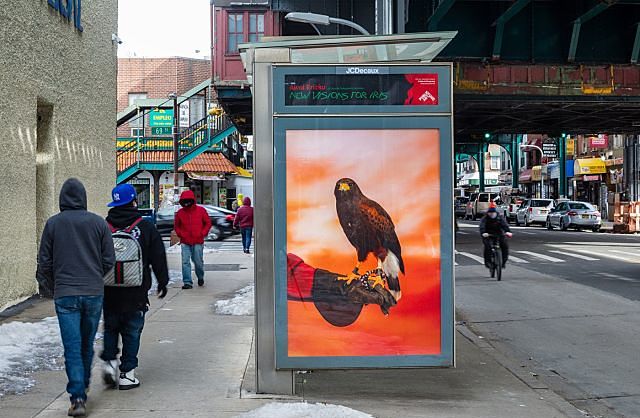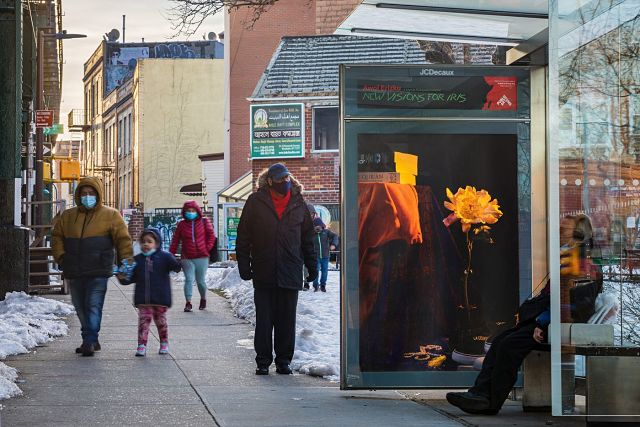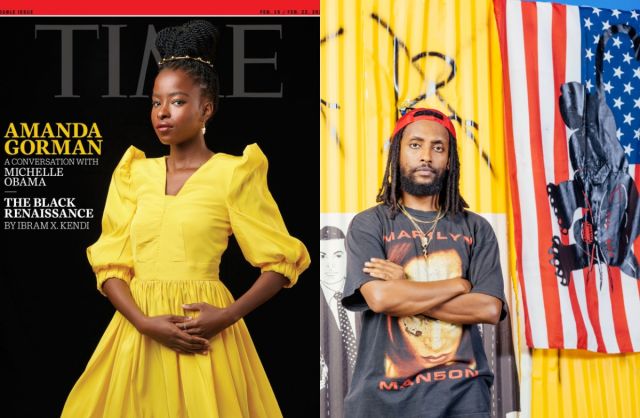 These photographs are part of “New Visions for Iris,” the first public art exhibition by the Los Angeles–based, Ethiopian American artist Awol Erizku. Commissioned by Public Art Fund, the exhibition appears on over 200 bus shelters across New York City (and over 150 in Chicago). Erizku dedicated it to his 1-year-old daughter, Iris. (Photo: Nicholas Knight, Courtesy of Public Art Fund, NY and the artist)
These photographs are part of “New Visions for Iris,” the first public art exhibition by the Los Angeles–based, Ethiopian American artist Awol Erizku. Commissioned by Public Art Fund, the exhibition appears on over 200 bus shelters across New York City (and over 150 in Chicago). Erizku dedicated it to his 1-year-old daughter, Iris. (Photo: Nicholas Knight, Courtesy of Public Art Fund, NY and the artist)
Curbed
If you pass by a bus shelter between now and June 20, take a closer look at it. You might spy the image of a Muslim man in a Kobe jersey kneeling in prayer next to a motorcycle, or a still life with a toy cart, irises, a light meter, and magnetic letters from the Amharic alphabet. These photographs are part of “New Visions for Iris,” the first public art exhibition by the Los Angeles–based, Ethiopian American artist Awol Erizku. Commissioned by Public Art Fund, the exhibition appears on over 200 bus shelters across New York City (and over 150 in Chicago). Erizku dedicated it to his 1-year-old daughter, Iris.
“[Iris’s] influence on this work is possibility,” Erizku says. “She’s American, she’s Ethiopian, and because I wasn’t able to see these kinds of images growing up, I wanted to make sure she did.” The kind of images he’s referring to include modern representations of Muslim men, African symbols, and his own personal history. “To be honest, I am ashamed I don’t know as much about my culture as I would like, and I wanted to give her these [references] early on.”

(Photo: Courtesy of Public Art Fund, NY and the artist)
The references are also entry points to conversations about religion, spirituality, race, identity, and personal history — conversations that many of us are having since the Black Lives Matter protests, the increase in hate crimes against Asian Americans, and the general upheaval the city has experienced in the past year.
“This exhibition is about coming to terms with fatherhood and having a daughter that’s coming into this world at a very tumultuous year, and finding ways to elicit certain conversations as she’s growing up,” Erizku says.
Erizku first became famous for work that subverted European masterpieces with Afrocentric references, like his 2009 Girl With a Bamboo Earring portrait, which riffs on Vermeer’s Girl With a Pearl Earring painting, and his 2013 portrait series of sex workers in Addis Ababa posed in the manner of Ingres’s odalisques and Manet’s Olympia. His 2015 short film “Serendipity,” which screened at MoMA, featured him smashing a bust of David and replacing it with one of Nefertiti. The 2017 maternity photos he took of Beyoncé — which referenced Madonna-and-child motifs and included original artwork he made the year before in collaboration with the floral designer Sarah Lineberger — nearly broke Instagram. But lately, he’s felt strongly about moving away from the Western philosophies and references he’s been indoctrinated with and creating his own canon. In 2017, his anti-Trump “Make America Great Again” exhibition explored the power of Emory Douglas’s Black Panther logo. This has led him to develop a new visual language he’s calling “Afro-esotericism” — an index of objects, symbols, and people that are meaningful and influential to him: Cowrie shells, African masks and statues, musical instruments, the Qur’an, flowers, and more. This reinvention is also partly a response to how popular his older work has become. His style has been copied time and time again, to the point where he feels like he’s lost ownership of it and it’s no longer associated with him.
Now Erizku’s photographs appropriate the dramatic lighting and saturated colors of commercial advertising, which is designed to stop you in your tracks. He uses it as a kind of bait and switch. Instead of selling you sneakers, he’s inviting you into his cultural universe.
He walked us through a few of the images in the series.
—
Related:
Spotlight: Ethiopian-American Artist Awol Erizku’s Photo of Poet Amanda Gorman on TIME Magazine‘s New Cover

TIME Magazine‘s new cover features American poet Amanda Gorman, photographed by Ethiopian-American artist Awol Erizku. (Photo of Awol Erizku by Jeff Vespa)
Fad Magazine
Updated: February 12th, 2021
AMANDA GORMAN, PHOTOGRAPHED BY ARTIST AWOL ERIZKU FOR TIME COVER.
TIME Magazine‘s new cover features American poet Amanda Gorman, photographed by Ethiopian-American artist Awol Erizku. Erizku is quickly becoming one of the most iconic photographers of our time.
Erizku is a multidisciplinary artist working in photography, film, sculpture and installation, creating a new vernacular that bridges the gap between African and African American visual culture, referencing art history, hip hop and spirituality, amongst other subjects, in his work.
“I was interested in allowing her to own the space that she’s in right now,” Erizku says. “We were going for timelessness, something that felt classical” and tied in to the “resurgence of a Black renaissance.”
It was a special moment for him, too. “Like many who witnessed the recent presidential Inauguration, I was captivated by her poem and her exquisite delivery,” says Erizku, who is based in Los Angeles and has exhibited at institutions including New York City’s Museum of Modern Art and the Studio Museum in Harlem. “For TIME, I wanted to extricate her from the political dimension and immerse it in a more cosmic atmosphere to add to the weight of her words.”
In a separate image featured inside the magazine, Gorman holds a white birdcage in a nod to the birdcage ring she wore on inauguration day. (That ring was a gift from Oprah, referring to previous inauguration poet Maya Angelou’s poem, “I Know Why the Caged Bird Sings.”)
“It needed a layer of depth that only poetry can explain,” Erizku says of the image.
A team of Black creative professionals prepared Gorman for the portraits: Jason Bolden styled her, Autumn Moultrie did her makeup, Khiry provided jewellery and the dress was from Greta Constantine.
The issue features Michelle Obama in conversation with American poet Amanda Gorman, whose poem ‘The Hill We Climb’ read at Joe Biden’s inauguration ceremony touched hearts and minds all over the world. The article, which covers issues such as the role of art in activism and the pressures Black women face in the spotlight, is also accompanied by a video shot and directed by Erizku.
—
Join the conversation on Twitter and Facebook.

























